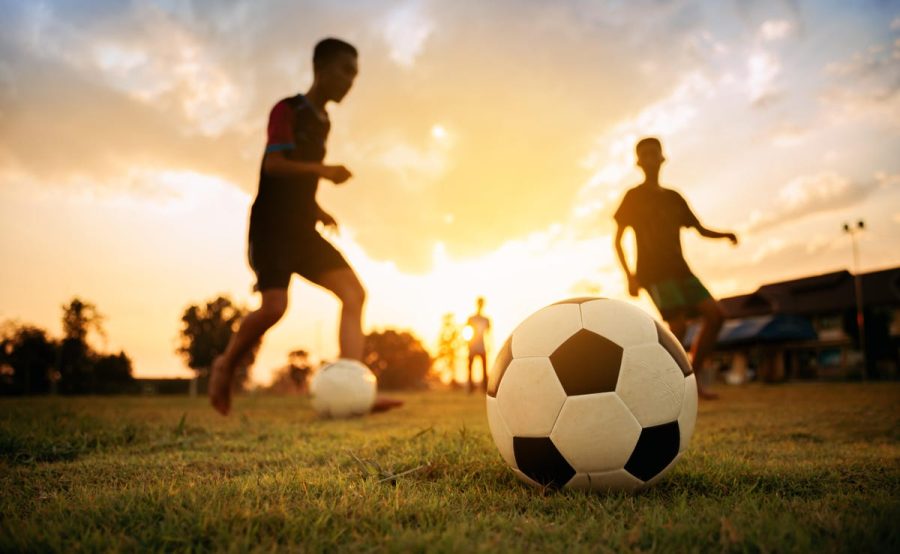The sidelines: the impact sports have on childhoods in America

More stories from Olivia Oorbeck
Sports have always been an important aspect in American Culture. Most children in the U.S. have played at least one sport before they turn 18-years-old. Recent polling shows that more than 70% of kids in the U.S., ages 13-17-years-old, have played a sport. Not only do Americans grow up playing sports, but we watch sports, spend money on sports, and read about sports. If you talk to most families, they usually have at least one sport they follow, play, or both!
Sports are a large part of our school systems. We have extracurricular sports teams that cost players money, and we even have athletic teams that travel to locations both in and out of state. We also spend a lot of our resources—both time and money—on sports equipment, sports teams, tickets to watch sports, and sporting lessons to improve our skills. With so much emphasis on sports, this obviously has a considerable impact on the youth of America.
Many children today participate in one or more sports, in which they are taught many different life lessons. Some of those lessons consist of teamwork, discipline, goal setting, and commitment. The lifelong impact of these lessons can be very valuable. Not only do kids learn valuable lessons from sports, but they also meet friends and create social relationships that can be incredibly positive and supportive. Often, these relationships can have a positive influence on decision-making and social choices. Kids often feel like they gain a second family when involved in a sports team. This means they are surrounded by these same people for hours on end; they are often relating to the pains and struggles they are going through, working together to achieve a goal or outcome, and evening learning to trust one another. With this in mind, it is easy to see how sports can have a positive impact on youth in America. Many athletes are able to incorporate many of these lessons into their everyday lives and often grow and develop from them.
Many young children who are involved in sports look up to professional athletes that are involved in the same sport. They are often influenced by what professional athletes say and do. This can be very positive for young people if the pro athlete is a positive force. However, pro athletes that are not involved in positive behaviors and environments can lead younger athletes astray or can have a negative impact on young people.
There are other ways sports can negatively impact American youth. There is a large number of American children who are forced or encouraged to pick a sport at a young age only to focus solely on that individual sport. With that come many pressures: pressure to be the best, pressure to live up to expectations, and pressure to be involved in a sport that maybe a child does not want to be in. Sport specification can lead to many young athletes “cracking under pressure”.
In an article printed in the Los Angeles Times, author Audrey Young says, “For young athletes competing at national and international levels, anxiety and depression were 20% to 45% — higher in some cases than those in the age-matched control groups which can turn to them losing their love or interest for the sport or sports that they are doing.”
Another issue that many young athletes are facing today is pushing themselves past the breaking point. When expectations are either given to them or they expect themselves to perform and are not achieved, a young person can feel incomplete or worthless. Many young athletes do not want to disappoint the people around them or ruin the reputation that they have worked so hard for. Often, athletes will keep pushing themselves past the warning signs that their own bodies are giving them. This can and often does lead to many irreversible injuries, both physically and mentally, that can end their sports career.
In hindsight, many athletes tend to become perfectionists because of the force and pressure to be perfect on the field, in the pool, on the track, or anywhere else young athletes participate in sports. Although sports can have a positive impact on a young person’s life, they can also have a negative impact. Young athletes should continuously look at the big picture and how the sport they are involved in is impacting them. Is the sport positively or negatively influencing or impacting their lives and health? If it is overwhelming, you have an injury, it is impacting your health or relationships negatively, or you have lost interest, should you continue participating? Young athletes learning to assess their well-being and advocate for themselves can be the most positive impact sports can play in their futures.

Olivia Oorbeck is a senior on the FHC Sports Report. She is excited about entering her second and final year on the staff. This year, she received the...



